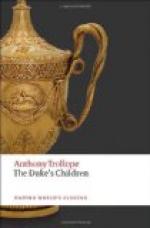‘Mr Tregear has got in at Polpenno,’ she said on the day on which she and the Duke had received the letters.
‘So I hear from Silverbridge.’
‘It will be a good thing for him I suppose.’
‘I do not know,’ said the Duke coldly.
’He is my cousin, and I have always been interested in his welfare.’
‘That is natural.’
‘And a seat in Parliament will give him something to do.’
‘Certainly it ought,’ said the Duke.
‘I do not think he is an idle man.’ To this the Duke made no answer. He did not wish to be made to talk about Tregear. ’May I tell you why I say all this?’ she asked softly, pressing her hand on the Duke’s arm every so gently. To this the Duke assented, but still coldly. ’Because I want to know what I ought to do. Would you mind reading that letter? Of course you will remember that Frank and I have been brought up almost as brother and sister.’
The Duke took the letter in his hand and read it, very slowly. ’What he says about young men without means going into Parliament is true enough.’ This was not encouraging, but as the Duke went on reading, Mabel did not think it necessary to argue the matter. He had to read the last paragraph twice before he understood it. He did read it twice, and then folding the letter very slowly gave it back to his companion.
‘What ought I to do?’ asked Lady Mabel.
’As you and I, my dear, are friends, I think that any carrying of a message to Mary would be breaking confidence. I think that you should not speak to Mary about Mr Tregear.’ Then he changed the subject. Lady Mabel of course understood that after that she could not say a word to Mary about the election at Polpenno.
CHAPTER 57
The Meeting at The Bobtailed Fox
It was now the middle of December, and matters were not comfortable in the Runnymede country. The Major with much pluck had carried on his operations in opposition to the wishes of the resident members of the hunt. The owners of coverts had protested, and farmers had sworn that he should not ride over their lands. There had even been some talk among the younger men of thrashing him if he persevered. But he did persevere, and had managed to have one or two good runs. Now it was the fortune of the Runnymede hunt that many of those who rode with the hounds were strangers to the country,—men who came down by train from London, gentlemen perhaps of no great distinction, who could ride hard, but as to whom it was thought that as they did not provide the land to ride over, or the fences to be destroyed, or the coverts for the foxes, or the greater part of the subscription, they ought not to oppose those by whom all these things were supplied. But the Major, knowing where his strength lay, had managed to get a party to support him. The contract to hunt the country had been made with him in last March, and was good for one year. Having the kennels and the hounds under his command he did hunt the country; but he did so amidst a storm of contumely and ill will.




